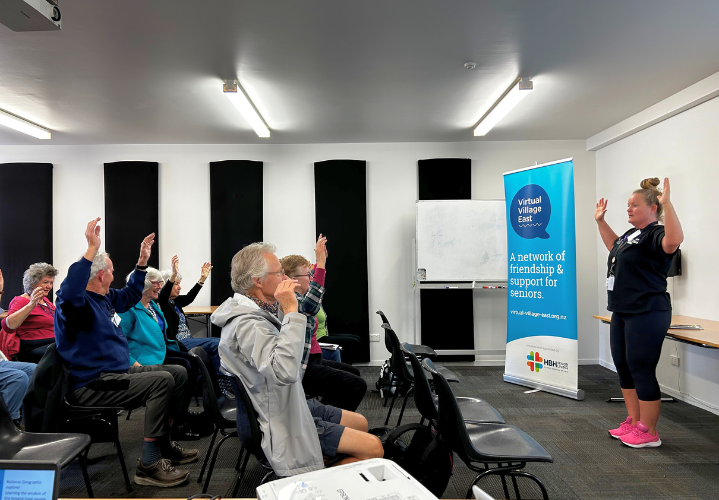
‘How to stay stronger for longer’
How to stay stronger for longer.
One of the five pillars of ageing well promoted by Virtual Village East is physical wellbeing. As we discovered at our recent information morning, there’s always more we can do to keep ourselves physically well and stay ‘stronger for longer’.
Most people think of their physical health in terms of cardio fitness, but as you age, strength becomes more critical said Bethan Collings, Age Concern’s Senior Community Strength & Balance Coordinator. “Lack of strength leads to frailty, which in turn, can result in health issues and an increased risk of falls.”
“From the age of 30 years, we start to lose muscle mass and by the time we’re in our 50’s, this has reduced by around 30%. Many people think that if they’re gardening, walking, or playing golf, they’re taking care of their fitness, but building strength requires its own exercise regime,” she said. “The common misconception is that if you’ve got your heart pumping, you’re keeping healthy, but you also need to build up muscle strength.” Beth said weight and resistance exercises are one of the best ways to build strength, with slow repetitions and heavy loads, whether it’s exercising at the gym, or doing Pilates or yoga.
Keeping yourself in check
Another misconception is that because we’re walking and standing, our balance is okay, but unfortunately, this isn’t always the case says Beth. She cites an example of a woman who biked and swam regularly; yet couldn’t stand on one leg for any length of time, despite having a high level of cardio fitness.
“Ideally you should do some balance exercises every day,” says Beth. These can be relatively simple exercises, like standing on one leg at a time, but the consistency of doing them daily is critical.” When you’re strong, have good balance and are active, you’re preparing yourself well for the years ahead.”
Beth also mentions the health benefits of exercising with others, such as joining Virtual Village East’s Safe & Strong exercise programme. “Social connections are one of the most important aspects of wellbeing as you age, so joining a class with your peers is a ‘win-win’!”
Eating well to age well
Diana Anderson, a Registered Nutritionist with Diabetes Foundation Aotearoa, also dispelled a few myths related to food during the seminar. She reinforced Beth’s message about losing muscle mass as you age. She also pointed out that, as well as exercising, it’s important to eat foods that support your muscles, particularly protein. Fibre is also very important as we age so rather than eating white rice or bread, change to brown rice or multi-grain bread. Oats and legumes are great at any age, and of course, so are fruit and vegetables.
Diana acknowledges that our social situation also changes as we age – rather than family mealtimes, you can often be on your own. “It can be easy to skip proper meals when you’re on your own, but it’s important to still eat healthily,” Diana says. “An omelette or frittata, or even a baked potato with a healthy filling such as tinned tuna and veggies are good examples of quick and easy meals that are perfect for one person or a couple. A salad with some fish or chicken is also good, as it’s important to eat vegetables on a regular basis.”
Diana says it’s vital to include Omega 3 fatty acids, found in fish such as salmon and tuna in our diets. “Tinned salmon or tuna is fine to keep costs down”, she says. Eating some dairy is also crucial. “Plant-based milks are very popular at the moment such as soy, oat and almond but they are fortified with calcium which means they are digested differently to the calcium in dairy milk.”
Proportions are also important says Diana, with Diabetes Foundation Aotearoa recommending that the average plate should contain one-quarter protein, one-quarter carbohydrates, and half vegetables (see image).
So, as our guest speakers pointed out, keep up the exercise (join our Safe & Strong classes), eat healthily (join our regular cooking classes), stay sociable (join any or all Virtual Village activities) and here’s to staying stronger for longer!
“As someone with diabetes, I found the tips from Diana Anderson were very helpful and practical. “I’ve made changes to my diet previously and seen the impact this can have, so I was most interested in what Diana had to say.” – Janet, VVE member
